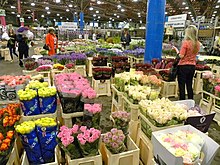New Covent Garden Market
This article needs to be updated. (April 2017) |

New Covent Garden Market is the largest wholesale fruit, vegetable, and flower market in the United Kingdom. Located in Nine Elms, London, the market covers a site of 57 acres (23 ha) and is home to about 200 fruit, vegetable, and flower companies. The market serves 40% of the fruit and vegetables eaten outside of the home in London[1] and provides ingredients to many of London's top restaurants, hotels, schools, prisons, hospitals, and catering businesses.

The Flower Market, which offers an extensive range of flowers, plants, foliages, sundries and interior decorations from the UK and from around the globe, is visited by 75% of florists in London, many of whom place morning orders and return to restock during the day as needed.[2] The Flower Market wholesalers are open from 04:00 to 10:00 Monday to Saturday and the Fruit & Vegetable Market wholesalers trade from around 00:00 - 06:00 Monday to Saturday.
There is a £5 entry fee for visitors driving to the market.[3] The nearest London Underground station is Vauxhall on the Victoria line. Vauxhall also has a railway station, with good connections to Waterloo and Clapham Junction, and a large bus station with buses departing frequently to destinations all across London. The proposed Nine Elms tube station on the Northern line extension to Battersea will serve the market.[4]
History

The market is run by a statutory corporation,[5] the Covent Garden Market Authority (CGMA), which reports to the Department for Environment, Food and Rural Affairs (DEFRA). Set up in 1961, the CGMA was charged with modernising and overseeing the administration of the vegetable market, then located at Covent Garden in central London, which was considered strategically important as a wholesale food and flower market.
Construction began in 1971 on the site of the former Nine Elms Locomotive Works and Nine Elms railway station, and the market opened on 11 November 1974.
Redevelopment

Since 1990, it has been the policy of successive governments to dispose of the market as a going concern.[6] Following a report by PricewaterhouseCoopers in 2005, the CGMA and DEFRA agreed on a plan (known as Project Chrysalis) to reform and redevelop the market to enable it to be eventually sold.[7] The CGMA, which had previously paid any profits as dividends to HM Treasury, was allowed to retain its profits to fund the initial planning work. On 7 January 2013, the CGMA signed a contract with Vinci and St. Modwen for the market's regeneration.[8] Most of the redevelopment will be funded by releasing spare land to the developers to build residential properties, with the overall project worth £2 billion. Work is expected to start in 2015 and be complete by 2020,[9] allowing the government to then disengage from the market.
References
- ^ "About the market". New Covent Garden Market. Retrieved 26 March 2013.
- ^ "About the market". newcoventgardenmarket.com. Retrieved 26 March 2013.
- ^ "General Information". newcoventgardenmarket.com. Retrieved 26 March 2013.
- ^ "How To Grow Flowers". 31 August 2019.
- ^ The Committee Office, House of Commons. "House of Commons - Public Accounts - Forty-Second Report". Parliament.the-stationery-office.co.uk. Archived from the original on 14 March 2012. Retrieved 26 March 2013.
- ^ The Committee Office, House of Commons. "House of Commons - Agriculture - Eighth Report". Publications.parliament.uk. Retrieved 26 March 2013.
- ^ "ARCHIVE: Defra, UK - Horticulture - New Covent Garden Market". Archive.defra.gov.uk. Archived from the original on 5 March 2012. Retrieved 26 March 2013.
- ^ Withers, Iain (7 January 2013). "Vinci and St Modwen sign £2bn Nine Elms agreement | Online News". Building. Retrieved 26 March 2013.
- ^ "St Modwen raises £49m for New Covent Garden build Ι Construction Enquirer". Constructionenquirer.com. Retrieved 26 March 2013.
External links
- Use dmy dates from March 2012
- Buildings and structures in the London Borough of Wandsworth
- Wholesale markets in London
- Food markets in the United Kingdom
- Flower markets
- Statutory corporations of the United Kingdom government
- Department for Environment, Food and Rural Affairs
- Buildings and structures completed in 1974
